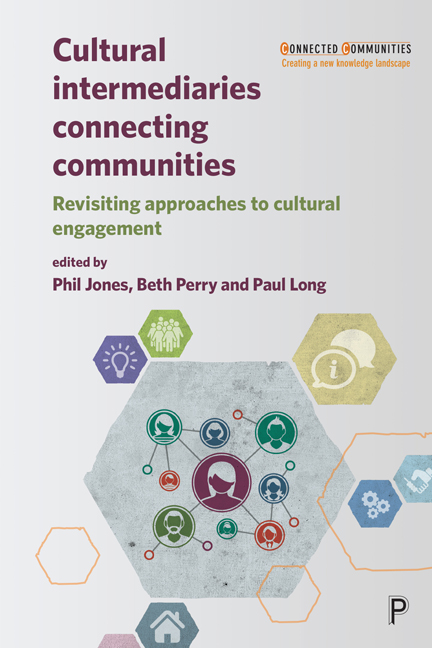Book contents
- Frontmatter
- Contents
- List of figures, tables and boxes
- Notes on contributors
- Acknowledgements
- Series editors’ foreword
- Introduction: Bringing communities and culture together
- Part One Changing contexts
- Part Two Practices of cultural intermediation
- Part Three Evaluation, impact and methodology
- Conclusion: where next for cultural intermediation?
- Index
five - ‘An area lacking cultural activity’: researching cultural lives in urban space
Published online by Cambridge University Press: 30 April 2022
- Frontmatter
- Contents
- List of figures, tables and boxes
- Notes on contributors
- Acknowledgements
- Series editors’ foreword
- Introduction: Bringing communities and culture together
- Part One Changing contexts
- Part Two Practices of cultural intermediation
- Part Three Evaluation, impact and methodology
- Conclusion: where next for cultural intermediation?
- Index
Summary
Introduction
Jakob and van Heur (2015) argue that, compared with the attention afforded the cultural policies and initiatives galvanising the creative sector, less is known about the role played across this field by intermediaries. While this absence is addressed across this volume (see also Perry et al, 2015), even less understood are the objects of intermediaries and their activities. By way of illustration, O’Connor (2004: 40) describes intermediation as a mode of translation ‘between the language of policy makers and that of the cultural producers’. How then, do individuals and communities that are earmarked for inculcation into the values of the cultural ecology understand the results of this translation? While there is a rich tradition of audience and visitor studies (see Tung Au et al, 2017; Hay, 2018), the specific ways in which individuals are situated by intermediation practices, policy imperatives, discourses and imaginaries as cultural consumers, participants and sometimes producers (see Chapter four) merits closer attention.
The Cultural intermediation project that impels this collection sought to investigate the connection between policies and people in terms of the variety of their roles across the cultural ecology, through explorations of sites in Salford (see Chapter thirteen) and Birmingham (here and Chapter four). Drawing on this research, this chapter investigates the relationship with the cultural ecology of people living in the Balsall Heath area of Birmingham.
Balsall Heath suggested itself as a site of investigation because of its demographic diversity, levels of deprivation, recent history of intercommunity dissonance and the relative visibility of its cultural assets. On this last note, Balsall Heath has been an object of cultural policy initiatives in which the neighbourhood saw a rise in available arts programmes which sought to engage disadvantaged and ‘hard-to-reach’ communities whether defined in terms of education, employment or cultural activity (for a summary, see Jancovich and Bianchini, 2013).
In proceeding, this chapter first outlines the particular socioeconomic character of this area in the context of a wider set of issues and policy impulses. It then discusses the method of walking interviews that was employed to engage with residents, of how residents guided researchers around local sites and scenes that are meaningful to them.
- Type
- Chapter
- Information
- Cultural Intermediaries Connecting CommunitiesRevisiting Approaches to Cultural Engagement, pp. 97 - 114Publisher: Bristol University PressPrint publication year: 2019



